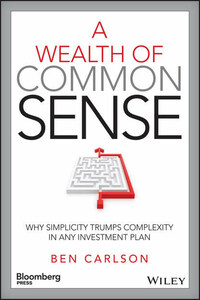Since 1996, Bloomberg Press has published books for financial professionals, as well as books of general interest in investing, economics, current affairs, and policy affecting investors and business people. Titles are written by well-known practitioners, BLOOMBERG NEWS>® reporters and columnists, and other leading authorities and journalists. Bloomberg Press books have been translated into more than 20 languages.
For a list of available titles, please visit our website at www.wiley.com/go/bloombergpress.
Cover image: Maze Solution © Wth/Shutterstock.com
Cover design: Tom Nery
Copyright © 2015 by Ben Carlson. All rights reserved.
Published by John Wiley & Sons, Inc., Hoboken, New Jersey.
Published simultaneously in Canada.
No part of this publication may be reproduced, stored in a retrieval system, or transmitted in any form or by any means, electronic, mechanical, photocopying, recording, scanning, or otherwise, except as permitted under Section 107 or 108 of the 1976 United States Copyright Act, without either the prior written permission of the Publisher, or authorization through payment of the appropriate per-copy fee to the Copyright Clearance Center, Inc., 222 Rosewood Drive, Danvers, MA 01923, (978) 750-8400, fax (978) 646-8600, or on the Web at www.copyright.com. Requests to the Publisher for permission should be addressed to the Permissions Department, John Wiley & Sons, Inc., 111 River Street, Hoboken, NJ 07030, (201) 748-6011, fax (201) 748-6008, or online at www.wiley.com/go/permissions.
Limit of Liability/Disclaimer of Warranty: While the publisher and author have used their best efforts in preparing this book, they make no representations or warranties with respect to the accuracy or completeness of the contents of this book and specifically disclaim any implied warranties of merchantability or fitness for a particular purpose. No warranty may be created or extended by sales representatives or written sales materials. The advice and strategies contained herein may not be suitable for your situation. You should consult with a professional where appropriate. Neither the publisher nor author shall be liable for any loss of profit or any other commercial damages, including but not limited to special, incidental, consequential, or other damages.
For general information on our other products and services or for technical support, please contact our Customer Care Department within the United States at (800) 762-2974, outside the United States at (317) 572-3993, or fax (317) 572-4002.
Wiley publishes in a variety of print and electronic formats and by print-on-demand. Some material included with standard print versions of this book may not be included in e-books or in print-on-demand. If this book refers to media such as a CD or DVD that is not included in the version you purchased, you may download this material at http://booksupport.wiley.com. For more information about Wiley products, visit www.wiley.com.
ISBN 978-1-119-02492-7 (Hardcover)
ISBN 978-1-119-02489-7 (ePDF)
ISBN 978-1-119-02485-9 (ePub)
Introduction:
Why Simplicity Is the New Sophistication
In 1776, Thomas Paine, a political activist, philosopher, and poet published a simple pamphlet that likely altered history as we know it. The title of his publication was plain and simple —Common Sense. This tiny pamphlet, which numbered less than 90 pages, inspired the original 13 colonies to seek their independence from Great Britain and form the United States of America. It's been said that virtually every rebel read, or at least listened to, the words written by Paine. This was Paine's introduction to Common Sense:
In the following pages I offer nothing more than simple facts, plain arguments, and common sense; and have no other preliminaries to settle with the reader, than that he will divest himself of prejudice and prepossession, and suffer his reason and his feelings to determine for themselves; that he will put ON, or rather that he will not put OFF, the true character of a man, and generously enlarge his views beyond the present day.1
Paine's simple words ignited the people of that day to fight for their independence. As John Quincy Adams, the second president of the United States, once said, “Without the pen of the author of Common Sense, the sword of Washington would have been raised in vain.” Paine's plain, common sense arguments provided the motivation that was so desperately needed to unite people from all walks of life to stand together in their cause. So why did Paine's words resonate with so many people? In a word – simplicity. Many writers of that day and age used dense philosophy and Latin to get their point across. Paine made his case for the benefits of independence by using clear, concise language that everyone could understand. Common Sense worked well with the crowds in the taverns, but was sophisticated enough to be given credibility by the Colonial dignitaries.








